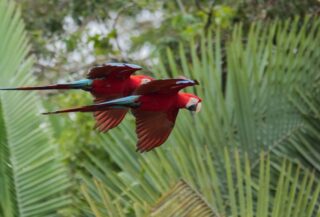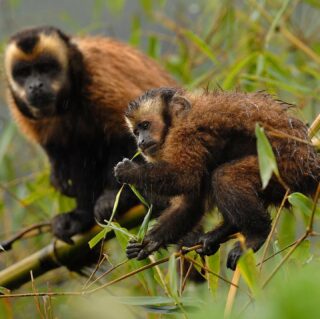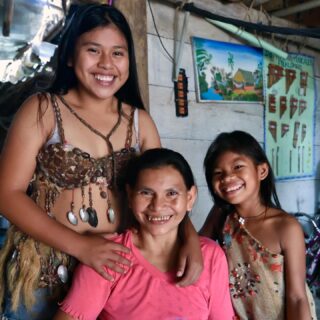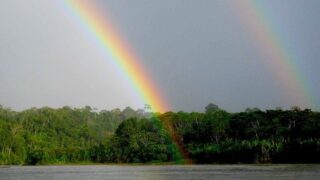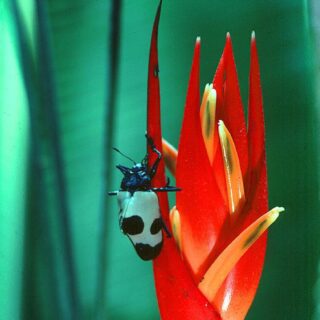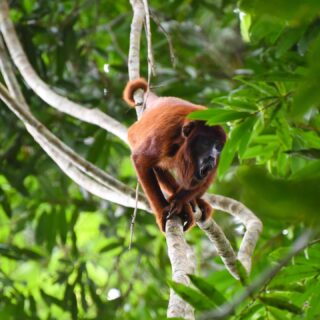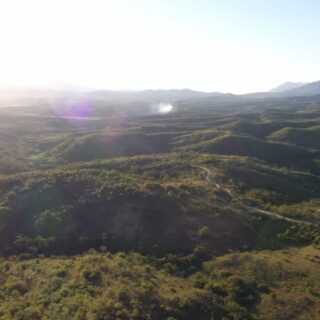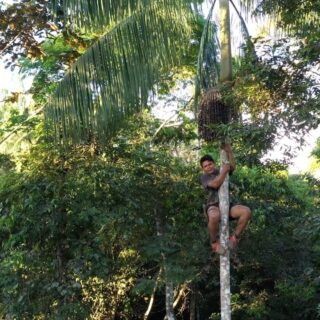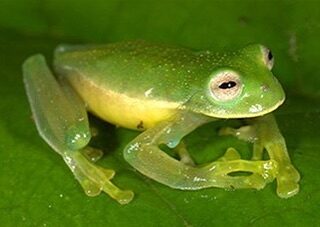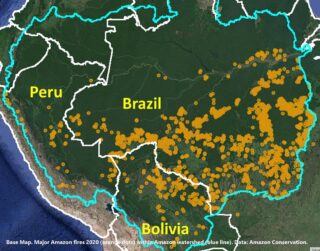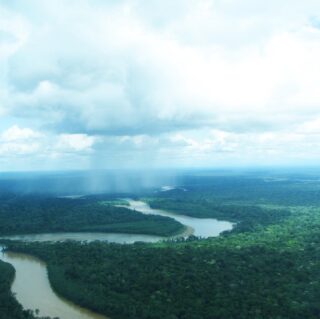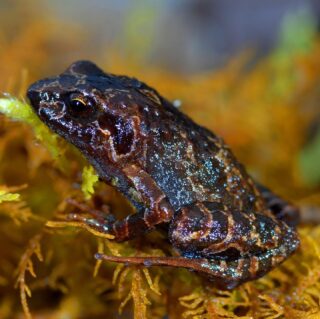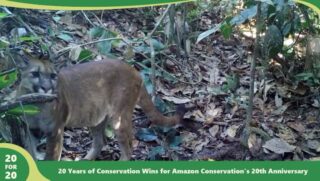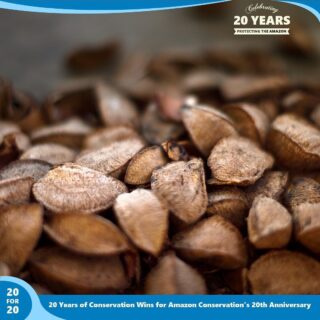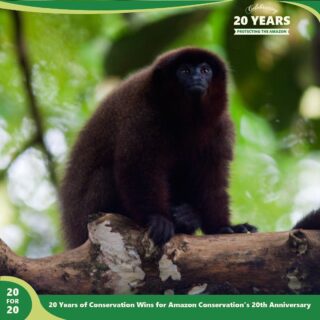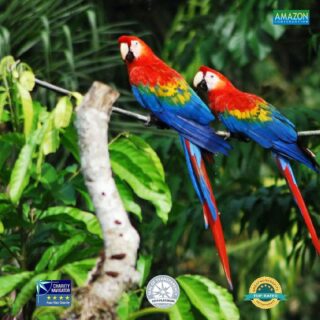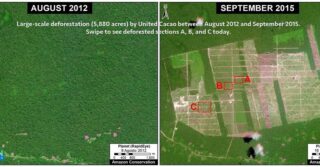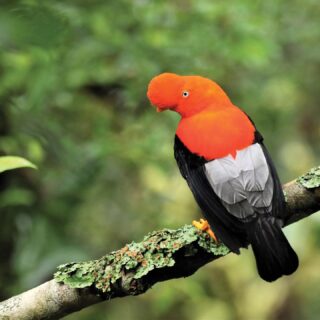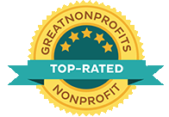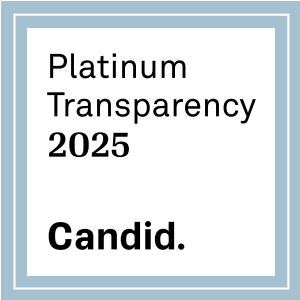Amazon Conservation Launches 25th Anniversary Year with Washington, D.C. Event
March 5, 2025
Amazon Conservation recently held a 25th-anniversary launch event in Washington, DC, to kick off this milestone year, reflect on all we have accomplished together for conservation, and discuss the future of the Amazon. The event was a space for community, gratitude, and renewed energy among friends and supporters as we look toward the next 25 years of conservation. It brought together our founders, Board Members, long-time supporters, and conservation experts for a set of engaging panel discussions, providing guests (both in-person and virtual) a unique opportunity to learn about our commitment and vision for conservation across the Amazon.
The event began with opening remarks from Jim Brumm, Amazon Conservation’s Board Chair, who welcomed our new and long-time friends, partners, and supporters and highlighted the need for continued collaboration and resiliency in the face of growing global challenges.,
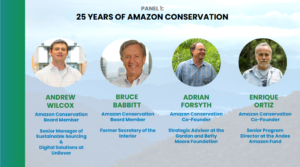 As we transitioned into the first panel, “25 Years of Amazon Conservation,” our Board Member and former Governor of Arizona and US Secretary of the Interior Bruce Babbitt led a dedication to our Co-Founders, Adrian Forsyth and Enrique Ortiz, reminiscing on their drive and dedication to bolstering conservation in lesser-known areas of the Amazon. The Co-Founders were presented with a special dedication gift from Amazon Conservation to celebrate their legacy and continued contributions to the organization and Amazon as a whole.
As we transitioned into the first panel, “25 Years of Amazon Conservation,” our Board Member and former Governor of Arizona and US Secretary of the Interior Bruce Babbitt led a dedication to our Co-Founders, Adrian Forsyth and Enrique Ortiz, reminiscing on their drive and dedication to bolstering conservation in lesser-known areas of the Amazon. The Co-Founders were presented with a special dedication gift from Amazon Conservation to celebrate their legacy and continued contributions to the organization and Amazon as a whole.
The first panel was moderated by Andrew Wilcox, who has been a friend of the organization for many years and recently joined our Board of Directors. Andrew is also the Senior Manager of Sustainable Sourcing and Digital Solutions at Unilever. He guided the conversation with Bruce Babbitt and our Co-Founders, Adrian Forsyth and Enrique Ortiz, who are also the Strategic Advisor for the Gordon and Betty Moore Foundation and the Senior Program Director for the Andes Amazon Fund, respectively. Adrian and Enrique shared their nostalgic stories of how they first fell in love with the Amazon, how they first decided to team up to found Amazon Conservation in 1999, and their reflections on the organization’s evolution and future path. This was a proud moment, reminding us of all that Amazon Conservation has accomplished and what we continue fighting for to this day. We were grateful to share these memories with all of our supporters, new and old, who continue to inspire our vision for a thriving and resilient Amazon.
Some highlights from the first panel included first-hand stories about Amazon Conservation’s early wins, including the establishment of the Los Amigos Conservation Concession in Peru, the world’s first conservation concession established through an innovative public-public partnership model and the home of the Los Amigos Biological Station–the first of our three biological stations in Peru. Speakers discussed the importance of the many groundbreaking scientific advancements and technological developments at Los Amigos, ManuBio, and Wayqecha Biological Stations in Peru, noting how understanding the complexity of the Amazon ecosystem–such as its intricate ecological functions–has “connected the dots” between the health of the forest and its global impacts. Furthermore, the speakers mentioned how the scientific research carried out by the late Thomas Lovejoy, world-renowned ecologist and former Amazon Conservation Board Member, directly influenced the founding of Amazon Conservation and our three strategic areas. In the 1970s, Tom recognized the critical need for preserving this ecosystem and, until his passing in 2021, advocated for the role of science in reinforcing conservation initiatives, which underlies our organization’s unique science-based approach.
Between the two panels, Amazon Conservation’s President John Beavers shared highlights of our 2020-2030 strategy and focus for the next decade. John emphasized our focus on halting illegal deforestation, particularly through technology-driven solutions such as our Monitoring of the Andes Amazon Program (MAAP), building a forest-based economy, and protecting the core of the Amazon (which covers 50% of the Amazon basin through protected areas and Indigenous territories. He also expressed the need for more collaboration in the region, and Amazon Conservation is taking a lead role in that by building a strong network of partners — such as local organizations, Indigenous groups, governmental entities, and others — that can be an united front to maximize conservation impact and drive policy action at scale.
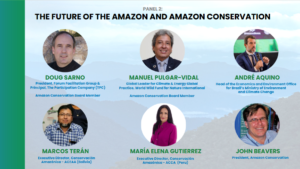 The second panel, “The Future of the Amazon and Amazon Conservation,” focused on the perspectives of local and international conservation experts. The panel was moderated by Doug Sarno, who is not only one of Amazon Conservation’s Board Members but also the President of the Forum Facilitation Group and the Principal for The Participation Company.
The second panel, “The Future of the Amazon and Amazon Conservation,” focused on the perspectives of local and international conservation experts. The panel was moderated by Doug Sarno, who is not only one of Amazon Conservation’s Board Members but also the President of the Forum Facilitation Group and the Principal for The Participation Company.
Manuel Pulgar-Vidal, Amazon Conservation Board Member, President of the UN Climate Convention’s 20th Conference of the Parties (COP 20), and former Minister of the Environment in Peru, noted that the Amazon faces many socio-political and economic challenges within a complex system of cooperation that should be considered when developing conservation solutions. He explained, “The Amazon is complex. We are not talking about nine very united and well-coordinated countries; it’s different countries with different approaches, with different ideologies, very fragmented, and in some way that has created difficulties for the [Amazon Cooperation Treaty Organization].”
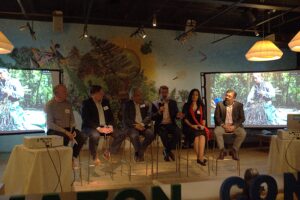
Another panelist, André Aquino, Head of the Economics and Environment Office for Brazil’s Ministry of Environment and Climate Change, shared his perspective on what conservation solutions can be prioritized in countries like Brazil. He mentioned that by building a forest-based economy, people will have more of an incentive to prevent deforestation, as forest products such as Brazil nuts and açaí hold economic potential for local communities. André commented, “Keeping deforestation low requires a change in development paradigm, [which] means generating value from the standing forest that we have not yet really developed in Brazil.” He further discussed how people living in cities outside of the Amazon must understand why its conservation is so important for them and for all so that they will support and advocate for solutions.
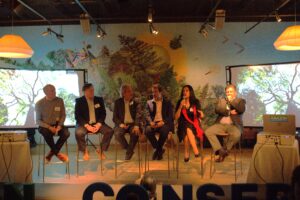
María Elena Gutierrez, Executive Director of our Alliance sister organization, Conservación Amazónica—ACCA in Peru, added that deforestation in Peru is drastically affecting local economies and that the organization is addressing this issue by empowering local authorities and Indigenous communities with legal and technical support to defend their territories. She explained, “They need to know their rights and how to present a legal demand, but also [know how to use] technology because it’s the way to defend themselves.” Marcos Terán, Executive Director of our Alliance sister organization Conservación Amazónica–ACEAA in Bolivia, also shared that science and technology are key to providing information that can drive decision-making for conservation solutions. He stated, “We are trying to scale up these kinds of solutions and generate information to show that it’s possible to live in a sustainable manner.”
As the program concluded, Amazon Conservation’s President John Beavers encouraged more proactive measures, such as direct contributions to organizations working on the ground, as well as growing collaboration and cooperation between Amazonian countries. In doing so, he expressed that this Amazon-wide collaboration can boost the progress and effectiveness of efforts to combat deforestation and keep the Amazon standing.
Inspired by panelists’ insights, Amazon Conservation remains committed to strengthening partnerships, advancing strategic regional and national conservation initiatives, and leveraging cutting-edge science and technology. We also continue to foster open dialogue with our partners across the region, embracing diverse perspectives that drive innovative conservation solutions while expanding our network of dedicated conservationists.
To our supporters who have helped us reach so many milestones over the past 25 years, thank you for your commitment to our work. We would not be able to achieve these 25 years of progress without our community of supporters like you. Together, we are making a meaningful difference for a thriving and resilient Amazon for generations to come.
To those who joined us for our launch event in person or via our livestream, a special thank you for helping us kick off this milestone year. Your commitment to a thriving Amazon fuels our mission and inspires us to do even more over the next 25 years.

